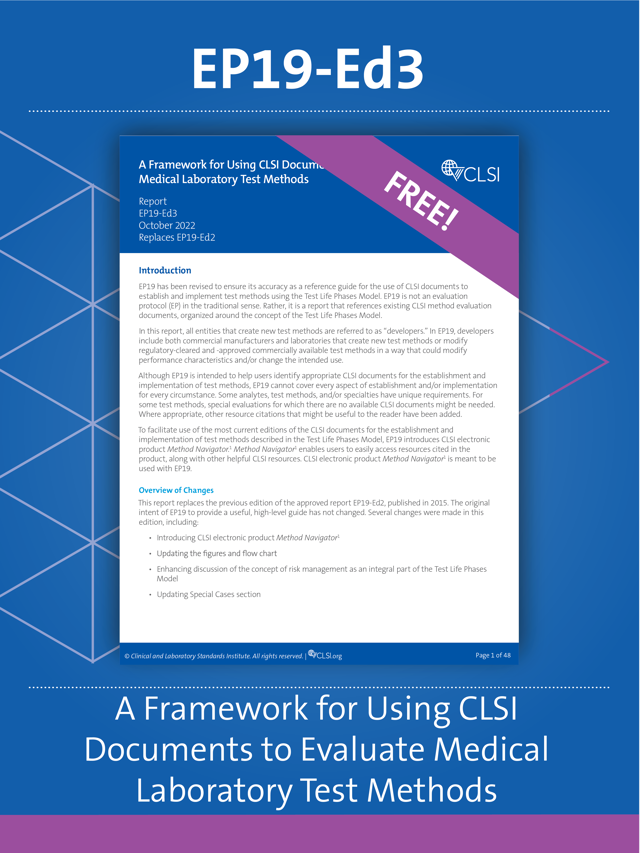CLSI Publishes 3rd Edition of EP19—A Framework for Using CLSI Documents to Evaluate Medical Laboratory Test Methods
10/28/2022

Malvern, Pennsylvania, USA—The Clinical and Laboratory Standards Institute (CLSI) has published the 3rd Edition of EP19—A Framework for Using CLSI Documents to Evaluate Medical Laboratory Test Methods. The 3rd Edition of the EP19 Report is available free, and introduces the Test Life Phases Model, which points users to CLSI evaluation protocol documents to establish and implement commercially manufactured or laboratory-developed test (LDT) methods.
“Developing and implementing an LDT in a high-complexity clinical laboratory often requires a considerable amount of technical and statistical knowledge. EP19 guides the reader through the test life phases and calls out all the relevant CLSI documents that can be used as guidance along the way. It is very useful to see all of the relevant EP and QMS documents in this context,” said Jennifer Rychert, PhD, D(ABMM), Co-Chairholder of the EP19 Document Development Committee.
Built off of CLSI document EP19’s “Test Life Phase Model,” CLSI’s new online subscription product, Method Navigator, is designed to be used with EP19, and includes links to requirements, guidance tables and evidence tables, and fillable and downloadable checklists. Method Navigator provides users with quick and easy access to specific guidance from CLSI documents. This new product was designed to help test developers—whether they are test manufacturers or laboratories developing tests—fulfill FDA, CLIA, ISO, and other requirements.
“CLSI document EP19 has recently been updated and refreshed,” said Paula Ladwig, MS, MT(ASCP), Co-Chairholder of the EP19 Document Development Committee and Chairholder of CLSI’s Expert Panel for Evaluation Protocols. “The new version is still an invaluable resource for developers of new or changed test methods to establish performance characteristics and for the laboratory end user for implementation of these test methods utilizing the Test Life Phase Model. The revised version introduces CLSI’s electronic Method Navigator to be used in conjunction with EP19; to help users provide the needed information for their Quality Management System. EP19 also contains an enhanced discussion of the concept of risk management as an integral part of the Test Life Phase Model.”
“CLSI's evaluation protocol (EP) and other documents provide a wealth of information to developers of in vitro laboratory tests,” said Jeffrey R. Budd, PhD, member of the EP19 Document Development Committee. “EP19 presents a model of laboratory test life phases from establishment through implementation. It places CLSI documents in the context of this model and, in doing so, informs developers what needs to be considered during the process of creating a laboratory test. To ensure the most up-to-date documents and citations are referenced, EP19 can be used in conjunction with Method Navigator, an interactive, electronic product.”
For more information about EP19 or Method Navigator, contact Joanne Christopher at jchristopher@clsi.org or +1.484.588.5907.
CLSI sets the standard for quality in medical laboratory testing. A not-for-profit membership organization, CLSI brings together the global laboratory community for the advancement of a common cause: to foster excellence in laboratory medicine.
For over 50 years, our members, volunteers, and customers have made CLSI a respected, transformative leader in the development and implementation of medical laboratory testing standards. Through our unified efforts, we will continue to set and uphold the standards that drive quality test results, enhance patient care delivery, and improve health care around the world.
By using CLSI standards, laboratorians can improve process quality, speed the development of standard operating procedures, and implement safer practices with greater ease and efficiency.
